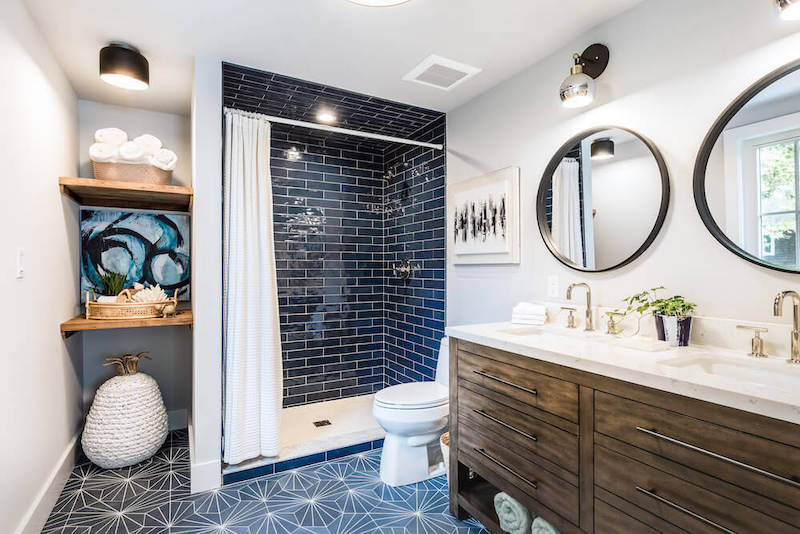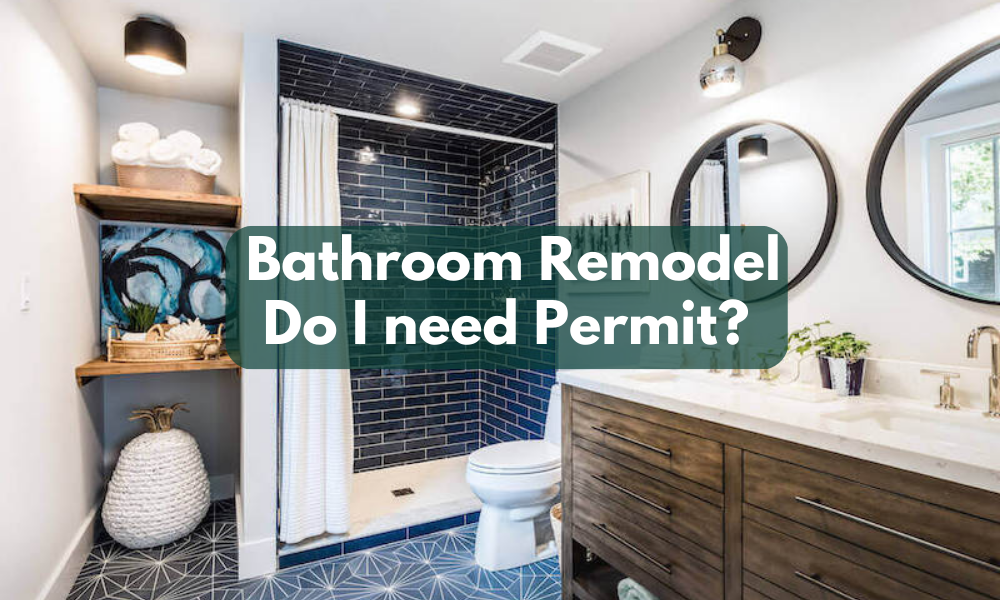Local Regulations and Permits

Navigating the world of bathroom renovations often involves a critical step: obtaining the necessary permits. These permits are not just bureaucratic hurdles; they are crucial for ensuring your project complies with local building codes, safety regulations, and environmental standards. Understanding the specific requirements in your region is paramount.
Permit Requirements in Different Regions, Are permits needed for a bathroom remodel
The need for permits and their specific requirements can vary significantly depending on your location. Cities, counties, and states have their own building codes and regulations that govern bathroom renovations. For instance, a minor bathroom update in a rural area might not necessitate a permit, while a complex renovation in a densely populated urban center may require multiple permits.
- Local Building Departments: The primary source of information is your local building department. They will provide you with a comprehensive list of permits required for your specific project.
- Online Resources: Many municipalities have websites with detailed information about permits, including application forms, fees, and guidelines.
- Homeowner Associations (HOAs): If you live in a community with an HOA, they may have additional rules and regulations regarding renovations, including permits.
Common Types of Bathroom Renovations Requiring Permits
While minor cosmetic updates might not always require permits, certain types of bathroom renovations often necessitate them. These typically involve changes that affect the structure, plumbing, or electrical systems.
- Structural Changes: Modifications that alter the load-bearing capacity of the bathroom, such as removing walls, adding windows, or changing the layout, usually require permits.
- Plumbing Work: Any changes to the plumbing system, including adding new fixtures, relocating pipes, or replacing the water heater, typically necessitate permits.
- Electrical Work: Installing new electrical outlets, fixtures, or wiring, or making significant changes to the electrical system, often require permits.
Scenarios Where Permits Might Not Be Necessary
Not all bathroom renovations require permits. Minor cosmetic updates, such as repainting, replacing fixtures, or installing new flooring, are often exempt from permit requirements. However, it’s crucial to check with your local building department to confirm the specific regulations in your area.
- Cosmetic Upgrades: Repainting walls, replacing faucets, or installing new tiles are generally considered cosmetic updates that don’t require permits.
- Minor Fixture Replacements: Replacing a toilet, sink, or showerhead with similar models typically doesn’t necessitate a permit.
- Cabinet Replacements: Replacing existing cabinets with new ones, provided they don’t involve structural changes, may not require permits.
Identifying the Relevant Authorities
Knowing which authority is responsible for issuing permits for your project is essential. The process can vary depending on your location.
- City or County Building Department: This is the most common authority for issuing building permits.
- State Licensing Board: In some cases, the state may require licenses or permits for specific trades, such as plumbing or electrical work.
- HOA: If you live in a community with an HOA, they may have their own permitting process or approval requirements.
Understanding Permit Application Processes: Are Permits Needed For A Bathroom Remodel

Navigating the permit application process for a bathroom remodel can seem daunting, but it’s crucial for ensuring your project complies with local building codes and safety standards. This section will guide you through the essential steps involved in obtaining a permit, including the required documentation, associated fees, and typical timelines.
Permit Application Requirements and Procedures
The application process typically involves gathering necessary information and documents, submitting them to the relevant authority, and paying applicable fees. This process ensures that your project meets local building codes and safety standards.
- Contact Your Local Building Department: The first step is to contact your local building department to obtain the necessary application forms and guidelines.
- Gather Required Documentation: The specific documents required can vary depending on your location, but generally include:
- Property Ownership Information: This may include your deed or tax assessment information.
- Project Plans and Drawings: Detailed plans showing the proposed layout, dimensions, and materials of the remodeled bathroom are essential.
- Contractor Information: If you’re using a contractor, you’ll need their license number and insurance information.
- Construction Specifications: These documents detail the materials and methods to be used during the renovation.
- Other Relevant Permits: Depending on the scope of your project, you may need additional permits, such as plumbing, electrical, or HVAC permits.
- Submit the Application: Once you have assembled all the required documentation, submit the application to the building department.
- Pay Fees: There will be a fee associated with the permit application, which varies depending on the project’s scope and location.
- Review and Approval: The building department will review your application and plans to ensure they meet local codes. If approved, you’ll receive a permit allowing you to proceed with the renovation.
Inspections During the Renovation Process
Inspections are a crucial part of the permit process, ensuring that your bathroom remodel adheres to building codes and safety standards throughout the construction phase.
- Scheduled Inspections: The building department will schedule inspections at specific stages of the renovation, such as after plumbing, electrical, and framing work.
- Purpose of Inspections: Inspectors will verify that the work meets building codes, including safety requirements for plumbing, electrical, and structural integrity.
- Corrections: If any issues or non-compliance are identified during the inspection, you’ll need to make the necessary corrections before the inspector can approve the work.
Consequences of Renovating Without Permits
Undertaking a bathroom remodel without the necessary permits can lead to various consequences, including fines, stop-work orders, and legal issues.
- Fines: You could face significant fines for working without a permit, especially if the building department discovers your project during an inspection.
- Stop-Work Orders: The building department can issue a stop-work order, halting your project until the necessary permits are obtained.
- Legal Issues: In some cases, renovating without permits can lead to legal action, especially if the work poses safety hazards or violates zoning regulations.
- Insurance Issues: If you have a problem with your bathroom remodel, such as a leak or electrical malfunction, your insurance company may not cover the damage if you didn’t obtain the required permits.
Essential Information for a Permit Application
The following table Artikels the essential information you’ll need to provide when applying for a bathroom remodel permit:
| Information | Details |
|---|---|
| Contact Information | Your name, address, phone number, and email address. |
| Property Information | Your property address, legal description, and tax identification number. |
| Project Scope | A detailed description of the proposed bathroom remodel, including the specific work to be performed (e.g., replacing fixtures, installing new flooring, expanding the space). |
| Drawings and Plans | Detailed drawings and plans of the existing bathroom layout and the proposed remodeled bathroom, including dimensions, materials, and any structural changes. |
| Contractor Information (if applicable) | The contractor’s name, license number, and insurance information. |
| Construction Specifications | Detailed specifications outlining the materials and methods to be used during the renovation. |
Factors Influencing Permit Requirements

The need for permits for bathroom remodeling projects is influenced by a complex interplay of factors, including the age of the property, the scope of the renovation, and the specific regulations of the local jurisdiction. Understanding these factors is crucial for homeowners to ensure compliance with local building codes and avoid potential legal issues.
Property Age and Historical Preservation Laws
The age of your property can significantly impact the permit requirements for your bathroom remodel. Older homes, especially those designated as historical landmarks or located in historic districts, often fall under strict preservation laws. These laws aim to maintain the original character and architectural integrity of the property. For instance, replacing a historic bathtub with a modern shower might require special permits or approvals from historical preservation agencies. It’s essential to consult with your local building department and any relevant historical preservation organizations to understand the specific regulations that apply to your property.
Scope of the Renovation and Building Codes
The extent of your bathroom remodel is another key factor determining the need for permits. Most jurisdictions have specific building codes that Artikel the types of renovations requiring permits. Generally, projects involving plumbing, electrical, or structural changes are more likely to require permits. For example, replacing a bathtub with a shower often involves plumbing modifications and may require a permit, while installing new bathroom fixtures like a toilet or sink might not necessitate one, depending on the specific local regulations.
Location and Zoning Restrictions
The location of your property within a specific jurisdiction plays a vital role in determining permit requirements. Different municipalities have varying building codes and zoning regulations. For instance, some areas might have restrictions on the size or placement of bathrooms, requiring specific permits for any alterations. Understanding the specific zoning regulations for your property is essential before starting any major renovation project.
Common Bathroom Remodel Projects Requiring Permits
- Replacing a bathtub with a shower: This often involves significant plumbing modifications, including the installation of new drain lines, shower pans, and water supply lines. These changes typically require a permit.
- Installing a new toilet: While replacing an existing toilet with a new one might not always require a permit, installing a new toilet in a location where there wasn’t one previously often necessitates a permit due to plumbing and waste disposal considerations.
- Adding a ventilation system: Installing a ventilation system in a bathroom, especially if it involves adding ductwork or vents, often requires a permit to ensure proper air circulation and prevent moisture buildup.
- Expanding the bathroom footprint: Any expansion of the bathroom area, whether by adding a new room or extending an existing one, will almost certainly require a permit due to structural changes and potential impacts on the building’s overall design.
Homeowner’s Insurance and Permit Requirements
Homeowner’s insurance policies can also play a role in permit requirements. Some insurance companies require proof of permits for renovations exceeding a certain value or scope. This is done to ensure that the renovations meet safety standards and to protect the insurance company from potential liability. It’s advisable to consult with your insurance provider to understand their specific requirements and how they might influence the scope of your bathroom remodel.
Are permits needed for a bathroom remodel – The need for permits during a bathroom remodel varies depending on the extent of the work. If you’re planning a major overhaul, like moving plumbing or electrical lines, it’s best to check with your local building department. For comprehensive information on bathroom remodeling in Kansas City, KS, you can find helpful resources at bathroom remodeling kansas city ks.
They can provide guidance on permits, codes, and best practices for your project.
The need for permits for a bathroom remodel often depends on the extent of the work, and it’s best to check with your local building department. If you’re in Milford, CT, and planning a bathroom makeover, you might find some useful tips and information about bathroom remodel Milford CT.
Regardless of where you are, it’s always wise to understand local regulations before starting any significant home improvement project.